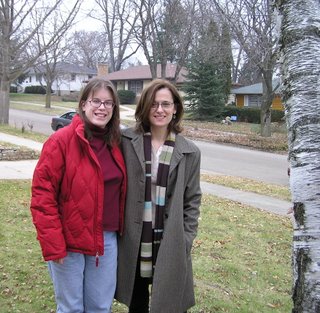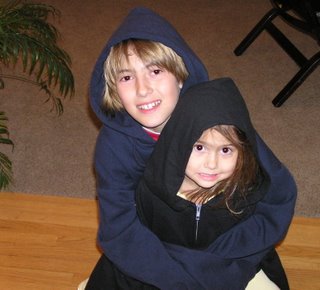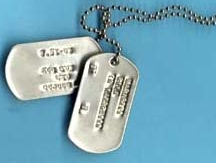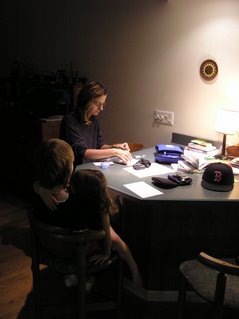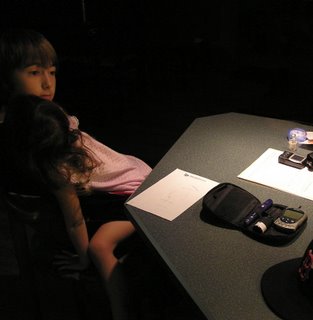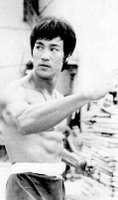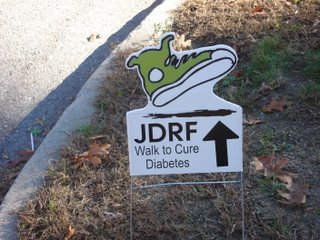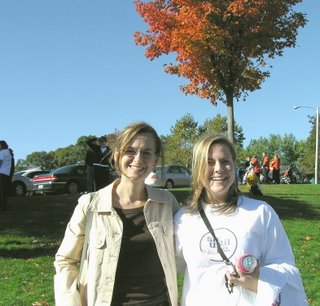His Eyes
"Mom, the toys here are kind of lame," Joseph informs me after scouting around the crowded waiting room for something with which to occupy both himself and his sister.
He's right-- there's really nothing here for children over the age of two.
Ah well. The three of us sit quietly together, occasionally looking up at "The Incredibles," as the movie plays on a small television suspended above the back corner of the room.
My mind starts to drift as Mr. and Mrs. Incredible search frantically for their missing children... our last time here was two years ago, shortly after Joseph's diagnosis. I remember the ophthalmologist saying then that our visit would establish a good "baseline."
I also remember hating hearing him say that, fearing what the term implied.
After nearly half an hour, a young man wearing a crisp white shirt and a tag that reads, "Resident," steps into the room and calls Joseph's name.
The Resident ushers Joseph into a large chair flanked by some odd looking instruments, while Evan and I take the two empty seats in a corner of the small, darkened exam room.
Joseph is handed what looks like a large black spoon and instructed to cover first one eye and then the other, while reading a chart.
He'll be fine.
He's only had this thing for a little over two years-- it can't have touched his eyes.
The exam goes on for a very long time-- the young Resident seems friendly and confident, but there's something I'm not liking about him. Maybe it's how his manner changes when Joseph resists his attempts to put drops of a numbing agent into his eyes.
"Come on," the Resident says in a frustrated voice, "you're a big guy-- this is nothing."
Joseph tries to explain-- "I don't really care about getting shots," he says, clearly agitated, "it's just anything with my eyes really freaks me out and-- "
Before he can finish, the Resident pulls down a lower lid and tries yet again.
Once in, Joseph winces-- telling him the drops sting.
The Resident says nothing, just begins prepping another instrument.
The exam continues for about 40 minutes, until more drops are placed in Joseph's eyes.
"You all will have to sit in the waiting room for another 40 minutes, until his pupils are dilated."
"Will I need eyeglasses?" Joseph asks as we leave the exam room.
He gives Joseph an inscrutable look before responding:
"I don't think so."
I'm really not fond of this guy.
When we return to the exam room, the Resident shines a bright light into Joseph's now dilated pupils, and says "hmm... uh huh," turns to write something down, and then repeats the procedure several times.
All the while, I'm fighting a desperate urge to scream.
Finally, he pushes back his chair, flicks on the light, and starts talking to my son.
"Well, everything looks fine. Just fine... " -- and then his expression is suddenly very serious -- "... but you know that you have diabetes and keeping good control is important. You want to keep that A1c at 7 or below-- stay away from the 8s and 9s -- or else... "
Oh God, please don't!
"... you're going to have some eye bleeds."
I clear my throat, the Resident turns to me, ignores my stricken expression, and continues.
"I had a girlfriend with diabetes, and I know this-- you really want to stay away from those high blood sugars, those two and three hundreds."
Joseph doesn't look at the Resident, just listens to his words while frowning down at his hands.
Only minutes ago, his blood sugar was 247.
"Excuse me," I say loudly, "But I think we need to clarify what you mean by 'eye bleeds'," then turning to Joseph, "Honey, you're not literally gonna see blood coming out of your eyes, it's really-- "
"It's called a hemorrhage," the Resident interjects, helpfully.
"Yes, but it's not as frightening as it sounds" I say, casting a glare in his direction.
"Also," I continue, "while it's certainly important to work toward good blood sugar control, with diabetes you're gonna see some blood sugars in the two and three hundreds-- sometimes higher. It's just unavoidable... "
And now I'm looking directly into the Resident's eyes, "... the HbA1c will also fluctuate, especially in a growing child-- again, because there are so many factors that can influence that number."
The Resident says nothing more.
A few moments later, we're joined by Joseph's pediatric ophthalmologist-- an older, jovial man who immediately praises Joseph for his good blood sugar control.
"You know, I saw a teenager just yesterday who also wears a pump-- I think he's having some trouble figuring it out though. His A1c was in the 9's."
Hmmm... clearly, the apple doesn't fall far from the tree in this practice.
"Well, to be fair," I begin, taking a deep breath, "I'm sure that teenager is dealing with a lot of fluctuating hormones, which can have a tremendous impact on blood sugars."
"I suppose you're right. In medical school I remember seeing an illustration of some scales," the doc says, holding up his hands as if they were the scales, "and insulin was on one side and all the other hormones were on the other." He laughs a little, then turns to Joseph.
"Let's have a look." And after a brief exam, "Well, looks like we won't need to see you all again for another two years. Terrific job. Everything looks great."
As we leave the building, Joseph is very quiet.
"Bud, you're not worried about anything you heard in there, are you?"
"You mean, am I scared that my eyes are gonna start bleeding all over the place?" he asks, smiling. "No -- we already talked about this stuff. That guy was kinda ridiculous, though. It didn't sound like he knew much about diabetes."
Then he pauses a moment.
And as I look down into my son's beautiful, brown, healthy eyes -- he continues:
"But at least he could see that my eyes are okay-- gotta give him props for that."
